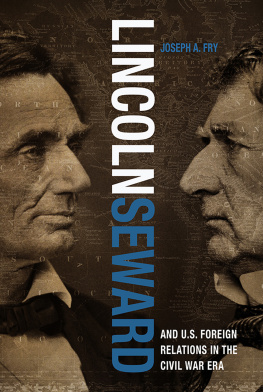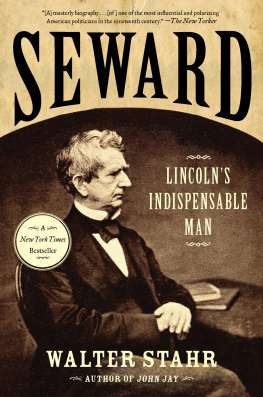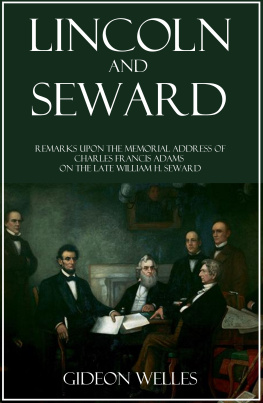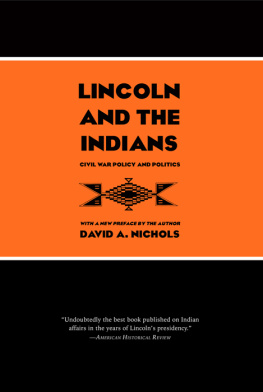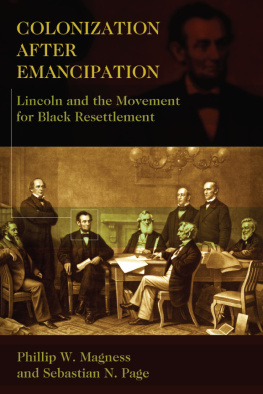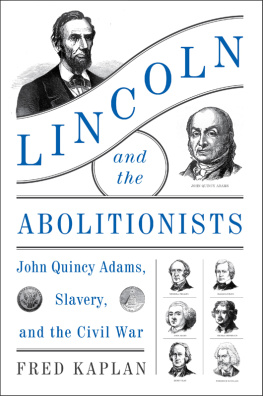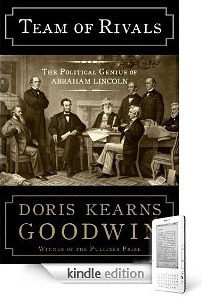Due to variations in the technical specifications of different electronic reading devices, some elements of this ebook may not appear as they do in the print edition. Readers are encouraged to experiment with user settings for optimum results.
Copyright 2019 by The University Press of Kentucky
Scholarly publisher for the Commonwealth,
serving Bellarmine University, Berea College, Centre
College of Kentucky, Eastern Kentucky University,
The Filson Historical Society, Georgetown College,
Kentucky Historical Society, Kentucky State University,
Morehead State University, Murray State University,
Northern Kentucky University, Transylvania University,
University of Kentucky, University of Louisville,
and Western Kentucky University.
All rights reserved.
Editorial and Sales Offices: The University Press of Kentucky
663 South Limestone Street, Lexington, Kentucky 40508-4008
www.kentuckypress.com
Library of Congress Cataloging-in-Publication Data
Names: Fry, Joseph A., 1947 author.
Title: Lincoln, Seward, and US foreign relations in the Civil War era / Joseph A. Fry.
Description: Lexington, Kentucky : University Press of Kentucky, [2019] | Includes bibliographical references and index.
Identifiers: LCCN 2018047826| ISBN 9780813177120 (hardcover : alk. paper) | ISBN 9780813177144 (pdf) | ISBN 9780813177151 (epub)
Subjects: LCSH: United StatesForeign relations18611865. | United StatesForeign relations1865-1898. | Lincoln, Abraham, 18091865. | Seward, William H. (William Henry), 1801-1872. | United StatesPolitics and government18611865. | United StatesPolitics and government18651869.
Classification: LCC E469 .F79 2019 | DDC 327.73009/034dc23
This book is printed on acid-free paper meeting
the requirements of the American National Standard
for Permanence in Paper for Printed Library Materials.
Manufactured in the United States of America
 | Member of the Association
of University Presses |
Dedicated to Ron Kyle.
INTRODUCTION
The Norths victory in the American Civil War had profound domestic and international significance. By prevailing in this epic conflict, the United States preserved both the nations territorial integrity and its experiment in republicanism and democracy. Sustaining territorial integrity and republicanism enabled the nation to continue its ascent toward world power status and to emerge in the twentieth century as the worlds foremost democratic government. The Souths secession and forceful defense of slavery challenged US nationalism, liberalism, and sense of providential destiny. The young nation had been an independent country for fewer than eighty years, and neither its survival nor its form of government was firmly established in 1861. To the contrary, at the midpoint of the nineteenth century, it was unclear that the nation stateas opposed to empires or confederationswould define the political organization of Europe and the Americas or that democratic government would not fall before monarchial or aristocratic rule in the western world. Therefore, the Unions victory provided a great boost to both nationalism and liberalism in the Americas and Europe and reinforced the American self-image as a chosen people.1
The Souths secession also interrupted the march of American imperialism, and the United States victory empowered the nation to resume that march and its path to becoming a great power. US territorial expansion after 1787 embodied an imperial process in which white Americans had overcome opposition from European opponents such as the British, French, and Spanish and New World foes such as Native Americans and Mexicans. The United States had imposed its will on weaker peoples, often forcefully seized territory, and ruled others without their consent. As it expanded across the continent, the United States had also practiced a pre-twentieth-century form of globalization, and foreign trade was a continuous concern for American farmers, manufacturers, and merchants. After 1820, this US territorial expansion had spawned an imperial competition between the North and South in which the two regions battled over control of the New West and disagreed over the merits of further US expansion into the tropical areas of the Western Hemisphere. The victory of Abraham Lincoln and the Republican Party in the 1860 presidential election signaled that the South and slavery would be excluded from the New West and would not expand into the tropics. Dixie had lost its persistent influence over US foreign policya foreign policy that had frequently been proslavery over the previous six decades. Faced with this new reality, the South seceded and attempted to form an independent country with its own foreign policy and imperial aspirations.2
Just as foreign policy considerations played a central role in the coming of the Civil War, the Norths superior foreign policies were crucial to the conflicts outcome. Richard Current cited the Norths significant advantages in population, industrial and military capacity, and natural resources and concluded, As usual, God was on the side of the heaviest battalions. The wars outcome was, of course, ultimately decided on the battlefields, but the seemingly stronger nation does not always win civil wars. Military, economic, and political intervention by outside third parties on behalf of the weaker side can tip the balance and could have done so in the American conflict. That no European power intervened on the Souths behalf to offset the Norths advantages ensured Confederate defeat.3
President Abraham Lincoln and Secretary of State William Henry Seward, two most unlikely partners, formulated and implemented the US foreign policies that forestalled European intervention. Lincoln and Seward had come to their respective offices from vastly different personal backgrounds and had been keen rivals for the Republican presidential nomination in 1860. When Lincoln won the nomination, Seward was left bitter and temporarily disillusioned. Still, their post-1860 partnership in many ways embodied what Joshua Wolf Shenk has characterized as the powers of two, or a relationship in which a pair of exceedingly talented, complex, alpha personalities forged a highly productive allianceone that succeeded because of power clarity and a clear hierarchical order that defined who functioned as the senior partner. Lincoln definitively established, and Seward accepted, that order in early 1861, and the partnership functioned superbly and without serious incident over the course of the war.4
Lincoln and Seward both recognized, and the president brilliantly articulated, the wars domestic and international significance. The United States grand republican experiment and the nations ability to defend its territorial integrity hung in the balance and carried enormous implications for the future viability of democratic government and the maintenance of US international influence. Both partners agonized over whether the nation would emerge from the war as a coherent continental nation or a balkanized group of smaller, rival countries, such as those in South America and Europe, that invited persistent outside interference. The two leaders agreed that preserving the Union was essential to realizing these US ideological and geopolitical objectives, although they periodically differed on the best foreign policy steps for defeating the Confederacy. For example, Seward promptly realized that the United States had no alternative but to succumb to British demands during the




